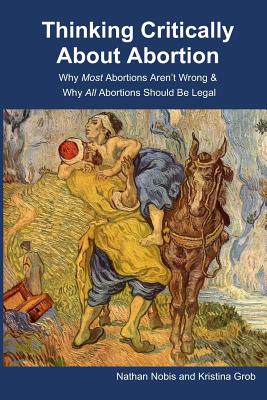Thinking Critically About Abortion: Why Most Abortions Aren't Wrong & Why All Abortions Should Be Legal

Thinking Critically About Abortion: Why Most Abortions Aren't Wrong & Why All Abortions Should Be Legal
This book introduces readers to the many arguments and controversies concerning abortion. It focuses on how to think about the issues, not just what to think about them. It is an ideal resource to improve your understanding of what people think, why they think that and whether their (and your) arguments are good or bad, and why. It's ideal for classroom use, discussion groups, organizational learning, and personal reading. From the Preface: "To many people, abortion is an issue for which discussions and debates are frustrating and fruitless: it seems like no progress will ever be made towards any understanding, much less resolution or even compromise. Judgments like these, however, are premature because some basic techniques from critical thinking, such as carefully defining words and testing definitions, stating the full structure of arguments so each step of the reasoning can be examined, and comparing the strengths and weaknesses of different explanations can help us make progress towards these goals. Here we use basic critical thinking skills to argue that abortion is typically not morally wrong. We begin with less morally-controversial claims: adults, children and babies are wrong to kill and wrong to kill, fundamentally, because they, we, are conscious, aware and have feelings. We argue that since early fetuses entirely lack these characteristics, they are not inherently wrong to kill and so most abortions are not morally wrong, since most abortions are done early in pregnancy, before consciousness and feeling develop in the fetus. Furthermore, since the right to life is not the right to someone else's body, fetuses might not have the right to the pregnant woman's body-which she has the right to-and so she has the right to not allow the fetus use of her body. This further justifies abortion, at least, until technology allows for the removal of fetuses to other wombs. Since morally permissible actions should be legal, abortions should be legal: it is an injustice to criminalizing actions that are not wrong. In the course of arguing for these claims, we: 1. discuss how to best define abortion;
2. dismiss many common "question-begging" arguments that merely assume their conclusions, instead of giving genuine reasons for them;
3. refute some often-heard "everyday arguments" about abortion, on all sides;
4. explain why the most influential philosophical arguments against abortion are unsuccessful;
5. provide some positive arguments tha
PRP: 41.70 Lei
Acesta este Pretul Recomandat de Producator. Pretul de vanzare al produsului este afisat mai jos.
37.53Lei
37.53Lei
41.70 LeiLivrare in 2-4 saptamani
Descrierea produsului
This book introduces readers to the many arguments and controversies concerning abortion. It focuses on how to think about the issues, not just what to think about them. It is an ideal resource to improve your understanding of what people think, why they think that and whether their (and your) arguments are good or bad, and why. It's ideal for classroom use, discussion groups, organizational learning, and personal reading. From the Preface: "To many people, abortion is an issue for which discussions and debates are frustrating and fruitless: it seems like no progress will ever be made towards any understanding, much less resolution or even compromise. Judgments like these, however, are premature because some basic techniques from critical thinking, such as carefully defining words and testing definitions, stating the full structure of arguments so each step of the reasoning can be examined, and comparing the strengths and weaknesses of different explanations can help us make progress towards these goals. Here we use basic critical thinking skills to argue that abortion is typically not morally wrong. We begin with less morally-controversial claims: adults, children and babies are wrong to kill and wrong to kill, fundamentally, because they, we, are conscious, aware and have feelings. We argue that since early fetuses entirely lack these characteristics, they are not inherently wrong to kill and so most abortions are not morally wrong, since most abortions are done early in pregnancy, before consciousness and feeling develop in the fetus. Furthermore, since the right to life is not the right to someone else's body, fetuses might not have the right to the pregnant woman's body-which she has the right to-and so she has the right to not allow the fetus use of her body. This further justifies abortion, at least, until technology allows for the removal of fetuses to other wombs. Since morally permissible actions should be legal, abortions should be legal: it is an injustice to criminalizing actions that are not wrong. In the course of arguing for these claims, we: 1. discuss how to best define abortion;
2. dismiss many common "question-begging" arguments that merely assume their conclusions, instead of giving genuine reasons for them;
3. refute some often-heard "everyday arguments" about abortion, on all sides;
4. explain why the most influential philosophical arguments against abortion are unsuccessful;
5. provide some positive arguments tha
Detaliile produsului









